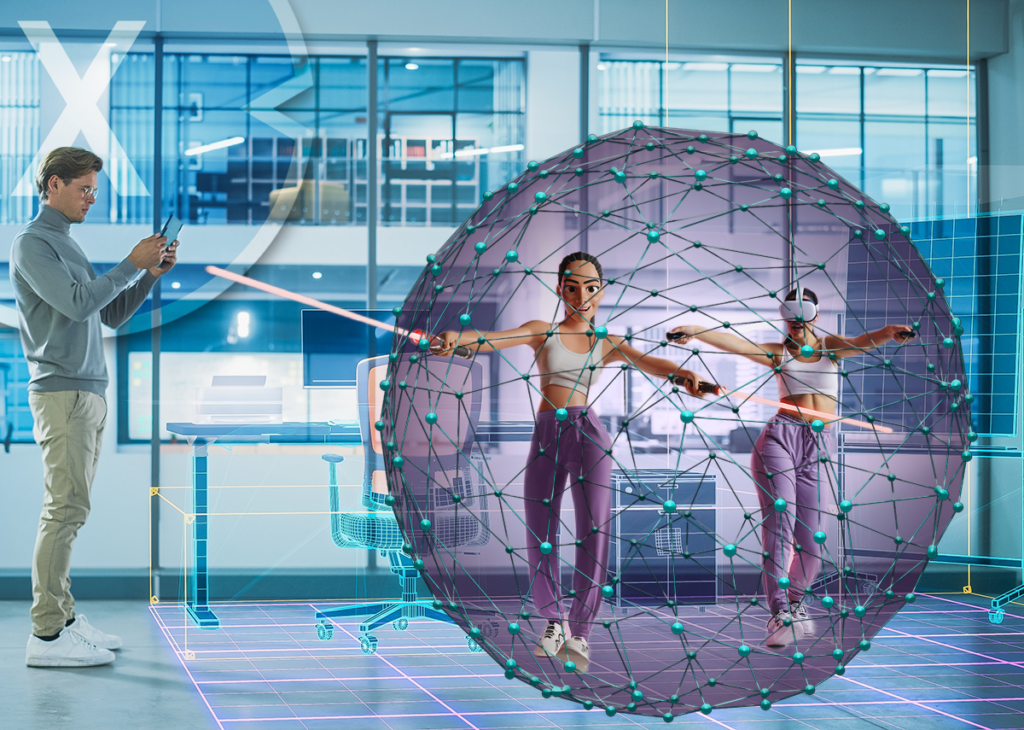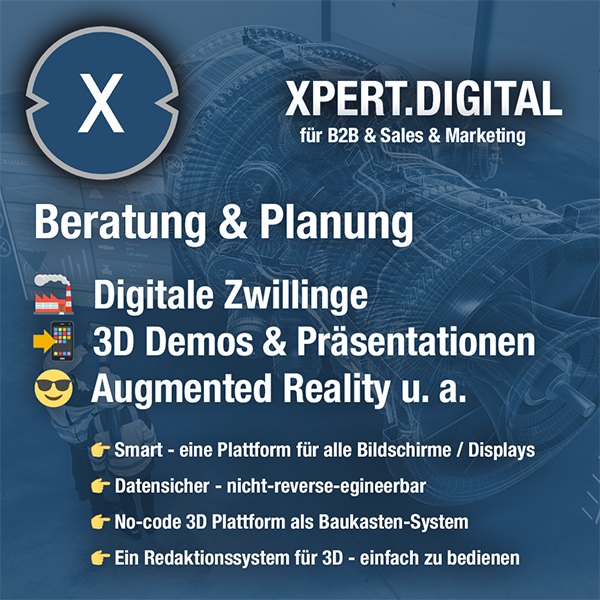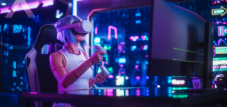XR technologies and the Metaverse improve UX design, UX research and UX applications?
Language selection 📢
Published on: October 17, 2023 / update from: October 17, 2023 - Author: Konrad Wolfenstein
📚 XR technologies improve UX research and UX applications
The integration of extended reality (XR) technologies, which include virtual reality (VR), augmented reality (AR) and mixed reality (MR), has significantly influenced the world of user experience (UX) in recent years. These technologies not only offer exciting possibilities for entertainment and gaming, but also have the potential to fundamentally change the way we conduct UX research and design UX applications. In this article, we will take a closer look at how XR technologies can improve UX research and applications.
🔍 1. Immersive UX research
XR technologies enable researchers to place users in immersive virtual environments. This has significant implications for UX research. Instead of asking users questions in a traditional environment, researchers can immerse them in a virtual world that is much closer to actually using a product or website. This allows for more realistic and meaningful results. For example, researchers can use VR glasses to allow subjects to test a new user interface for a smartphone in a virtual environment. This real-world experience provides valuable feedback that would be difficult to obtain in traditional research environments.
🎨 2. Prototyping and design in XR
The use of XR technologies has also revolutionized the prototyping and design of UX applications. Designers can now create interactive prototypes in VR or AR to test the user experience before actual development. This makes it possible to identify problems and opportunities for improvement early on and avoid costly changes in later development phases. Additionally, designers can design and test user interface and interactions directly in an XR environment, resulting in better end products.
🌍 3. UX testing in the real world
AR technologies provide the opportunity to conduct UX testing in the real world. By overlaying digital information onto the physical environment, researchers can conduct user testing in an authentic context. For example, they could develop an AR app that provides information about landmarks in a city. Users could then use this app in the actual environment, providing realistic feedback and insights into user behavior.
📚 4. Improved training and onboarding
XR technologies are also increasingly being used in training and onboarding processes. Companies can create immersive training environments where employees can learn new skills or familiarize themselves with products and services. This makes it possible to convey complex information in an understandable and engaging way, resulting in a better learning and user experience.
♿ 5. Accessibility and inclusion
Another area where XR technologies improve UX is accessibility and inclusion. By using AR, information can be customized in real time for people with different needs and limitations. For example, texts in AR apps can be enlarged or translated into sign language to better support people with visual or hearing impairments. This helps create inclusive UX applications.
💡 6. Challenges and concerns
Although XR technologies undoubtedly offer many benefits for UX research and applications, there are also challenges and concerns. One of them is the question of cost. Developing VR and AR applications can be expensive, especially for smaller companies. In addition, there are still technical challenges, such as motion sickness in VR or the limitations of AR glasses. Privacy and ethical issues also need to be considered as XR applications often access personal data.
👏 Potential
XR technologies show significant potential to improve UX research and applications. They enable immersive research, realistic prototypes, real-world UX testing, better training and increased accessibility. Despite some challenges, integrating XR into UX practice is an exciting development that is helping to take user experiences to new levels.
📣 Similar topics
- 🔮 The future of UX research: XR technologies in focus
- 🌐 Virtual Realities: A Look at the UX Revolution
- 👓 The magic of XR: Relive UX design
- 🚀 XR Prototyping: The Future of UX Design
- 🌟 Augmented Reality in UX testing: Realistic insights
- 📚 Learning in a new dimension: XR in training
- ♿ XR for everyone: accessibility and inclusion in UX
- 💡 Challenges and Opportunities: XR in the UX World
- 📈 The Potential of XR: Changing the UX Landscape
- 🧐 XR technologies in practice: opportunities and risks
#️⃣ Hashtags: #UXResearch #XRtechnologies #UXApplications #Innovation #Accessibility
📋 What is UX design and how does it influence the metaverse, the internet and e-commerce?
User experience design, or UX design for short, is a crucial aspect of the digital world. It deals with designing products and services to improve user satisfaction and efficiency. UX design encompasses a wide range of elements including user interfaces, interactions, accessibility and usability. This article will discuss what exactly UX design is and how it influences the emerging metaverse, the internet in general, and e-commerce.
📝 1. What is UX design?
User experience design, or UX design for short, is a multidisciplinary approach that aims to make the interaction between people and products or services as pleasant and effective as possible. The focus is on the satisfaction and well-being of the users. UX designers consider a variety of factors including user interfaces, interactions, accessibility, performance, and usability.
🌐 2. The importance of UX design on the Internet and e-commerce
UX design plays a crucial role on the internet and e-commerce. In today's digital world, users have become more demanding and have high expectations of the products and services they consume online. Good UX can make the difference between a successful online business and a failed attempt.
Website user interfaces
A user-friendly website with a clear and intuitive interface leads to a better customer experience and higher conversion rates. UX designers work to design websites so that they are easy to navigate and relevant information can be found quickly.
E-commerce shopping experience
In e-commerce, the shopping experience is crucial. From product search to checkout process to delivery, everything needs to be smooth and user-friendly. A well-designed UX in e-commerce can increase customer loyalty and increase sales.
🪄 3. The Metaverse and UX Design
The Metaverse is an emerging concept that connects the digital and physical worlds. It is often described as an immersive virtual reality where people can interact, work and play. The Metaverse is expected to have a profound impact on various industries, including UX design.
Immersive user interfaces
In the Metaverse, users will be completely immersed in the digital environment. UX designers must develop immersive user interfaces that make users' interaction with this new world seamless.
Social interactions
The Metaverse will also be a platform for social interactions. This means that UX designers need to develop social elements and features to encourage communication and user engagement.
Trading in the Metaverse
Trading is expected to play an important role in the metaverse. UX design will be crucial to crafting shopping experiences in the metaverse that meet user needs.
🚀 4. Challenges for UX design in the metaverse
UX design in the Metaverse also presents some challenges. Here are some of them:
Technical complexity
The metaverse requires complex technologies such as virtual reality (VR) and augmented reality (AR). UX designers must ensure that these technologies are integrated seamlessly and in a user-friendly manner.
Privacy and security
In the Metaverse, users will share a lot of personal data and information. UX designers need to ensure privacy and security are ensured to gain user trust.
Accessibility
The Metaverse should be accessible to everyone, regardless of physical or cognitive limitations. UX designers must develop accessible solutions to ensure an inclusive experience.
🔮 5. The future of UX design in the metaverse
The future of UX design in the metaverse is exciting and full of possibilities. UX designers are expected to play a key role in how people experience and use the Metaverse. From virtual workspaces to interactive educational environments, the Metaverse will open up new ways to design user experiences.
UX design has a significant impact on the metaverse, the internet, and e-commerce. It will help make these digital worlds more user-friendly, efficient and fun. Collaboration between UX designers, technologists and industry experts will be crucial to fully exploit the potential of the metaverse and shape a better digital future.
📣 Similar topics
- 🌐 The importance of UX design in the digital world
- 🚀 UX design and the emerging metaverse
- 🛒 UX design in e-commerce: customer retention and increased sales
- 👾 Metaverse: Challenges and Opportunities for UX Designers
- 🌟 The future of UX design in the metaverse
- 🖥️ User Interfaces and Interactions: UX Design Explained
- 💼 Virtual Workspaces in the Metaverse: UX Design in the Future of Work
- 🤝 Social Interactions in the Metaverse: The Role of UX Design
- 🔒 Data protection and security in the metaverse: The task of UX designers
- 🌈 Accessibility in the Metaverse: UX design included
#️⃣ Hashtags: #UXDesign #Metaverse #ECommerce #User Interfaces #Future Technologies
🗒️ Xpert.Digital: A pioneer in the field of extended and augmented reality

Find the right Metaverse agency and planning office such as a consulting firm - Image: Xpert.Digital
🗒️ Find the right Metaverse agency and planning office such as a consulting firm - search and search for top ten tips for consulting & planning
In the age of digitalization, where technologies such as Extended Reality (XR) and the Metaverse are constantly becoming more relevant, Xpert.Digital positions itself as an opinion leader and pioneer. With over 1,500 specialist articles, Xpert.Digital has established itself as a central point of contact for the industry.
🌌 Extended Reality (XR): The best of both worlds
Extended Reality is a collective term that includes virtual reality (VR), mixed reality (MR) and augmented reality (AR). Xpert.Digital is committed to creating immersive XR experiences that are both informative and entertaining.
- Interactive Experiences: XR allows users to immerse themselves in virtual worlds and interact with their surroundings in ways previously unimaginable.
- Education and Training: XR can be used for educational purposes to convey complex topics and concepts in an understandable and tangible way.
- Entertainment: Whether games, films or art – XR opens new horizons in digital entertainment.
🔮 Augmented Reality (AR): See the world through digital eyes
Augmented Reality, a particular focus of Xpert.Digital, makes it possible to integrate digital information or graphics into the real world. The possibilities are nearly unlimited.
- Marketing and Advertising: AR can be used to create interactive advertising campaigns that engage customers in a whole new way.
- Everyday help: From navigation apps that project the route directly onto the street to furniture apps that show what a new sofa would look like in the living room - AR makes it possible.
🌐 The Metaverse: The Next Big Thing
The Metaverse is a virtual world where people can interact through avatars and create shared experiences. Xpert.Digital recognizes the enormous potential of the Metaverse and is working to translate this potential into usable products and services.
- Social Interaction: The Metaverse offers the opportunity to connect with people from all over the world and share common experiences.
- Economy and trade: Virtual goods and services can be traded in the metaverse, which opens up completely new business models and sources of income.
- Creative Freedom: From building your own worlds to designing custom avatars, the Metaverse is a place of endless creative possibilities.
🚀 Xpert.Digital at the forefront of innovation
Xpert.Digital shows how a company can be at the forefront of the technological revolution. With their focus on XR, AR and the Metaverse, they are well positioned to shape and define the future of digital interaction.
More about it here:

We are there for you - advice - planning - implementation - project management
Xpert.Digital - Pioneer Business Development
Smart Glasses & KI - XR/AR/VR/MR industry expert
Consumer metaverse or meta -verse in general
If you have any questions, further information and advice, please feel free to contact me at any time.
I would be happy to serve as your personal advisor.
You can contact me by filling out the contact form below or simply call me on +49 89 89 674 804 (Munich) .
I'm looking forward to our joint project.
Xpert.Digital - Konrad Wolfenstein
Xpert.Digital is a hub for industry with a focus on digitalization, mechanical engineering, logistics/intralogistics and photovoltaics.
With our 360° business development solution, we support well-known companies from new business to after sales.
Market intelligence, smarketing, marketing automation, content development, PR, mail campaigns, personalized social media and lead nurturing are part of our digital tools.
You can find out more at: www.xpert.digital - www.xpert.solar - www.xpert.plus
























